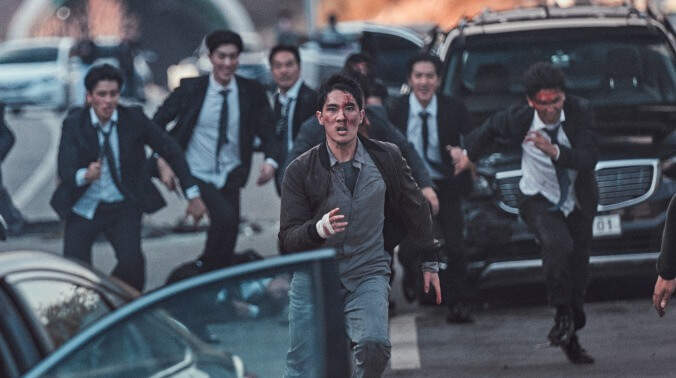Night In Paradise brings a stylish, wearyingly grim South Korean crime epic to Netflix

Two gangs, the Yang and Bukseong, have gathered for a summit to stem the hemorrhaging of goons from both. The negotiations, which will end some lives and save others, unfold across a table headed by Police Director Ma (Cha Seung-won). It has a built-in rotating tray, allowing those seated to fetch sauces and pour drinks as needed. But this turntable also neatly illustrates one of Night In Paradise’s major ideas: that in a world where everyone thinks themselves smarter and more ruthless than everyone else, no one is really in charge of anything. They’re all on the same circular path, headed nowhere.
The visual storytelling in this dark and violent character study is impeccable. South Korean writer-director Park Hoon-jung specializes in angular compositions and elegant transitions, directing the hell out of a bleak journey through the gangster life. Night In Paradise is an exceptional resource for anyone trying to understand how stories can be told within the frame, even as it consistently trips on its relentless grimdark tendencies. There are no pleasant people to be found here; there is no path that doesn’t lead to the grave.
Tae-gu (Uhm Tae-gu) is a low-level criminal in the employ of Boss Yang (Park Ho-san). He has a great suit and a good reputation, and is handy with negotiations and assassinations as needed. He dotes on his niece and cares for his sick sister while keeping the hamster wheel of the criminal game spinning. And then everything collapses for him, leaving him with nothing to lose, a chip on his shoulder, and the will to start redistributing some power. But the South Korean criminal scene is as complex and precarious as the corporate world, and an endless chain of secrets and conspiracies send Tae-gu to the island of Jeju, where he can lay low, stew in his juices, and encounter the terminally ill Jae-yeon (Jeon Yeo-been), who would be a Manic Pixie Dream Girl if she weren’t so busy being a deadpan Nomi Malone instrument of chaos. She’s an expert shot who suffers no fools, even as she gets drunk and fucks with the police.
Park loves every stab and crunch and gluggy throat slash, and he loves this milieu. He’s so fixated on its meticulously ordered hierarchies that at time the film feels like a throwback to ’90s American relics like Things To Do In Denver When You’re Dead. It’s an achievement, crafting an in-depth crime epic that at no point glamorizes any aspect of the nefarious lifestyle; there’s a cumulative power to the film’s laser focus on the inevitable shitty turns awaiting us all. But it’s exhausting, too. The only source of pleasure in the universe Park creates is the stray artisanal fish recipe. Sex is eschewed, alcohol is merely an escape hatch, and money is practically an abstraction. Nearly every interaction ends in betrayal, tragedy, or tragic betrayal, with “shocking” final act revelations one might guess before the main title card even comes up.
That the film is such an unforgiving pit of quicksand is one reason why its centerpiece action sequence, a chase that starts in an airport and ends in the middle of a highway, is so ruthlessly effective. When the viewer is conditioned to expect the culling blade at all times, a disruption of that mentality—especially one so skillfully orchestrated—hits especially hard. It doesn’t alter the narrative vector, and it doesn’t reclassify the movie from “bleak drama” to “action,” but it is a remarkable callback to Park’s screenplay for I Saw The Devil and his down-and-dirty superhero epic The Witch Part I: Subversion. Those previous works also put audiences through the wringer, but with some sparks of narrative pleasure. Night In Paradise is undiluted by such concessions.